|

photo - mw
_______________________
Paducah
Robert Wrigley
memorious
for my father
As though only from within the gaps,
the circular enclosures, interstices,
staves, and serifs, twenty-odd letters or so,
also diphthongs, digraphs, and blends blended
in an utterance that seemed entirely
and only vowels, but for certain minimal ticks,
bi-labials and thin fricatives, the enunciations
of dust from a distance, from up close
the pale and weightless declarations
of fog. Only now and then a syllable
half-discerned and rarer still a word
heard as a known symbol and signifier,
usually goddam or son-of-a-bitch,
as noun, adjective, adverb, or interjection.
He was telling us, or himself, a story,
a narrative certain inflections of which
suggested one of us ought to nod or respond
with our own interjection, with a wow
...(more)
_______________________
New Ancestors: A Conversation with McKenzie Wark
e-flux
I think we need new ancestors. The old ones, in art and theory, have been exhausted and are exhausting us. One can’t just be done with the past, however. One always takes two steps back to take three steps forward. But I think it’s time to see the archive more as a Borges-like labyrinth rather than a lineage, particularly on the theory side. So I’m working on an alternate history of the intersection of critical theory and the avant-gardes in the twentieth century. The Beach Beneath the Street and Spectacle of Disintegration are putative volumes three and four of a series.
Molecular Red, which I am completing now, is volume one. It’s about Alexander Bogdanov, Lenin’s rival for the leadership of the Bolshevik Party and the founder of Proletkult. It’s also about Andrei Platonov, the finest product of the Proletkult avant-garde. It’s a way to thread through a certain moment of the October Revolution, a different moment than the Trotskyist one, which keeps asking over and over where it all went wrong. It’s also an alternative to what is usually taken to be the avant-garde of the Soviet twenties—the futurists, constructivists, formalists. In the latter story, Proletkult is usually conspicuously absent, because its practitioners wanted so much more than a new style—they wanted a whole new mode of production in culture and science.
In short, I’ve been spending some time showing the riches that have been left out. We don’t need to keep quoting Heidegger for fuck’s sake. Art does not have to be endless iterations of the Duchampian gesture. We don’t have to revive Lenin, as if no other radical thought ever existed. I’m rather drawn to heretics. If we must have ancestors, let’s not have the Name of the Father. Let’s have funny aunts and queer uncles. It’s much more fun, and maybe it’s even a way to unblock the stasis in contemporary art and theory. You have to admit that it’s been a bit boring.
...(more)
_______________________
All That Is Solid Melts: Comments on McKenzie Wark’s Politics for the Anthropocene
(Part 1 of 2)
Edmund Berger
Synthetic_zero
(....)
Wark finds importance in Bogdanov and proletkult for multiple reasons (the development of tectology will be discussed in part 2). He draws out attention, for example, to one of the most notable members of proletkult, Anton Platonov, who moved from a variety of industrial jobs to becoming a renowned writer. In 1921 he quit the party over its turn to the New Economic Policy; when famine broke out a year later he abruptly quit writing and turned to work as an electrical engineer in the countryside. Like Bogdanov, Wark writes, Platonov was concerned with infrastructure, or more properly a workable knowledge of infrastructure that contained within the pieces of the world the revolution offered but failed to deliver: “How could our collective labours know and organise the world and themselves? How can the resistance of matter and the mental resistance of labour be overcome?” There is a feedback loop between infrastructure and science: it is through the infrastructure of apparatuses that science emerges, and it is from these sciences that infrastructure are engendered. Experience too is organized by an infrastructure of apparatuses: if we follow Bogdanov, this in turn sets the conditions for the social, and by extension, our relations to the modes of production. Hence the need to understand the infrastructure, and more importantly, the need to change it.
(....)
I find Wark’s call to look backwards to new ancestors like Bogdanov to be such an invigorating experiment in thought. If Zizek has been right about one thing, it is that we need to consider what happens on the days following the great transformation. We’ve already undergone, and continue to undergo, great transformations! The revolution that is capitalism’s current organizational platform continues to remake the world, supercharging planetary mutations on a grand, ecological scale. In Bogdanov’s time, proletkult’s mission was the play with new forms of life and construct a new civilization in the midst of the ruins. This is precisely what we have to do today, but we’re not tailing in the wake of any communist revolution. The ruin we face is one of social relations, of governance, of economics, and the ecosystem. It entails that new platforms, be it ethico-aesthetic, retooled technology, punk praxis, salvagework, need to actively courted and generated. At the very least, let us have its spectral cartography, and do with it what we can.
...(more)
_______________________
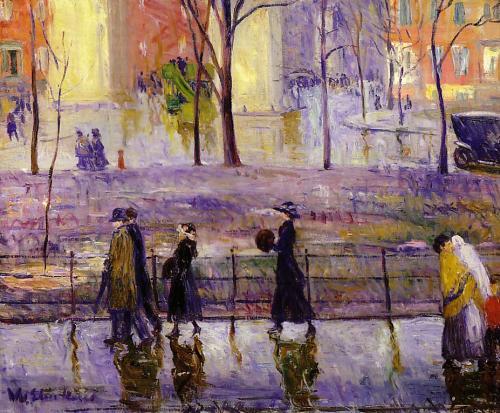
March Day
Washington Square
1912
William Glackens
b. March 13, 1870
_______________________
The Apollonian: A Journal of Interdisciplinary Studies
Volume 1, Issue 2
Focus: Poetry and Philosophy
Refiguring Giorgio Agamben’s Potentiality through Mina Loy’s Poetics [pdf]
Missy Molloy
Giorgio Agamben’s diverse philosophical projects share a common feature— his sustained attention to states of suspension that undermine, without transcending, binary oppositions. The oppositions these states of suspension span shift, yet his attraction to in-between-ness rarely wavers. Two key terms Agamben uses to approach this indeterminate space are "threshold" and "potentiality". This article explores these terms in relation to Mina Loy’s poetic approach to heterosexuality and the reproductive body. Although Agamben rarely focuses on the specificity of female biology, the crucial concepts that cohere his works resonate in striking ways with Loy’s writing on female sexuality, labor, and maternity. _______________________
Collegium Volume 15
Cosmopolitanism and Transnationalism: Visions, Ethics and Practices
Edited by Leena Kaunonen
Introduction [pdf]
Leena Kaunonen
There are many ways of understanding cosmopolitanism and transnationalism as terms, theories and experience in academia. Although originally referring to quite different phenomena, the issues and questions they address increasingly overlap today. Given the current situation of the debate about cosmopolitanism and transnationalism and the rapid growth in the literature on both of them, no one writing on the topic can claim to occupy a privileged position to give either of them a definite, fixed meaning. Instead, there are multiple perspectives on both topics and they have raised several intriguing questions. Are we to understand cosmopolitanism and transnationalism in terms of individual identity and difference, border-crossing and post-national communities or in terms of world citizenship or global justice? What are the values, ideas and ideologies associated with the cultural, social and political meanings of cosmopolitanism and transnationalism? What are the ideological implications of using discourses of cosmopolitanism?
This volume seeks to conduct a critical discussion about the content and various meanings of cosmopolitanism and transnationalism and to develop a shared, yet varied, understanding of the issues raised by it. The contributions focus on the social sciences, ethnographic work in anthropology and on research on transnational practices in literature and social media. Building on insights drawn from the research data, they aim to shed light on the interpretive and contextual framework of both concepts. The wealth of different approaches, definitions and the sheer number of research publications make it difficult to give an overview of the ‘main’ topics or place. It is in the nature of this discussion that scholars have diverging views of the contents and meaning of cosmopolitanism and transnationalism. (....)
_______________________
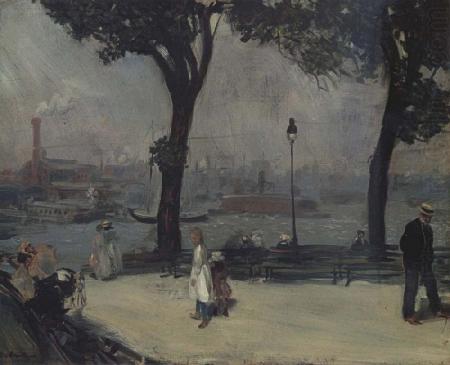
East River Park
William Glackens
_______________________
Maidan, Caliphate, and Code:
Theorizing Power and Resistance in the 21st Century
Arthur Kroker and Michael A. Weinstein
ctheory
_______________________
The Performative Economy of the Racial Speculative
Angela Mitropoulos
s0metim3s
Abstract
This paper focuses on the conjunctures between contemporary financial speculation, national security and border control systems for what these can illustrate about changing practices of race and racism. Pivotal to these systems are procedures that emphasise potential and unspecified threats that may occur in the future alongside an understanding of uncertainty as the condition of economic value. This paper emphasises the interlocking character of racialised panic and economic value that sets about transforming the present in the guise of an imagined future.
_______________________

photo - mw
_______________________
Fast-world values
Judy Wajcman
aeon
(....)
So are we right to blame the digital revolution for accelerating the pace of life and quickening time? No. Everyone still has 24 hours in a day, seven days in a week and 12 months in a year. Technology mediates our relationship with time, but humans’ lived experience of time remains beyond uniform acceleration. When I sit with my 95-year-old mother in the nursing home and glance at my smartphone, I am simultaneously in extremely slow and extremely fast time. Digital technology is really good at facilitating this duality. It enables people to experience time differently from one moment to the next, or even at the same moment. It multiplies the diverse temporalities in our lives.
...(more)
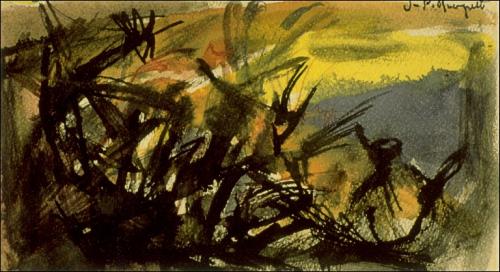
Conversation
Jean-Paul Riopelle
d. March 12, 2002
_______________________
A Translation of "Als ich »Verstörung« von Thomas Bernhard las" by Peter Handke
Translation by Douglas Robertson
The Philosophical Worldview Artist
When I Read Gargoyles by Thomas Bernhard
(....)
The prince talked as if his life depended on it. He repeated many of the same phrases over and over again, varying nothing but their word-order. To his interminable generalizations he suddenly appended the phrase: these colossal walls! The prince did not say that he was in despair; he said: these colossal walls! For the prince, all names, even place names, were names of despair. By midday he had received visits from three applicants for the steward’s position; he had managed to torture one of the applicants repeatedly with words. In conversing with the applicant he ascertained which words the man could not bear to hear and repeatedly used these words; for instance, mole, linen, miner, reformatory. The applicant reacted to these words as if he were being tortured.
No matter which words the prince addressed to his listeners, they were words of sensitivity, words of torture. I read on as the prince talked for hours to his visitors about the applicants, in the course of doing which he was incessantly vaulting from the picturesque, concrete particulars of these people—one of them lived in a landscape that was so gloomy that it actually precluded suicide, and his clothes were so neat that they must have hung on a nail and not in a closet—to certain incessantly iterated unpicturable abstractions that complementarily imparted picturesqueness to the prince. The prince was possessed by speech; he spoke, he said, out of a fear of suffocation.
The prince talked as if his life depended on it. He repeated many of the same phrases over and over again, varying nothing but their word-order. To his interminable generalizations he suddenly appended the phrase: these colossal walls! The prince did not say that he was in despair; he said: these colossal walls! For the prince, all names, even place names, were names of despair. By midday he had received visits from three applicants for the steward’s position; he had managed to torture one of the applicants repeatedly with words. In conversing with the applicant he ascertained which words the man could not bear to hear and repeatedly used these words; for instance, mole, linen, miner, reformatory. The applicant reacted to these words as if he were being tortured.
No matter which words the prince addressed to his listeners, they were words of sensitivity, words of torture. I read on as the prince talked for hours to his visitors about the applicants, in the course of doing which he was incessantly vaulting from the picturesque, concrete particulars of these people—one of them lived in a landscape that was so gloomy that it actually precluded suicide, and his clothes were so neat that they must have hung on a nail and not in a closet—to certain incessantly iterated unpicturable abstractions that complementarily imparted picturesqueness to the prince. The prince was possessed by speech; he spoke, he said, out of a fear of suffocation.
...(more)
via flowerville_______________________

Alberto Burri
b. March 12, 1915
_______________________
Stuck
Arno Camenisch
Translated by Donal McLaughlin
Context N°24
(....)
And didn’t you also say, says the reader, that—for you—the art of writing was to say something without naming it. ?You wrote that in an article in that literary magazine, didn’t you? Thanks for the quotations, says the author, that’s ?very observant of you. And then the author can feel free to go skiing and get stuck in the chairlift on the last journey up in the fog. It’s then up to him whether he wants to go skiing, self-determination is supreme, says the reader, but the texts need to manage without the author, they need to stand on their own. Yes, where would we be, says the author, if the author were to start explaining his texts, let’s talk about the weather instead. The ?weather stands by you, says the reader. The author lights another cigarette and holds out the packet to the reader, no, thank you, says the reader, I no longer smoke actually, my ex-wife no longer smokes either.
Do you play an instrument at least, asks the author. I used to play the trombone, says the reader, and you? As a child I played the drum, says the author. Oh, says the reader, looking straight ahead. A good text is unpredictable, you said that too, or didn’t you, says the reader. Did you hear something, asks the author, there’s something there. There’s nothing there, says the reader, it’s the ghosts you’re hearing. Beside my washing machine at home is a ghost, says the reader. Have you a washing machine, asks the author. Yes, says the reader, taking a new little bottle from his inside pocket. Here, do have a drink, says the reader, it will help you. The author puts on his ski goggles. My ex-wife always said: if you drink, you’re also allowed to be drunk. Is that you praying, asks the reader. No, I’m just cold. Why have you stopped talking, asks the reader. Aha, I understand, says the reader, what also distinguishes a good author is knowing exactly when not to say anything. Don’t look at me like that, says the reader, you said so yourself.
...(more)
_______________________
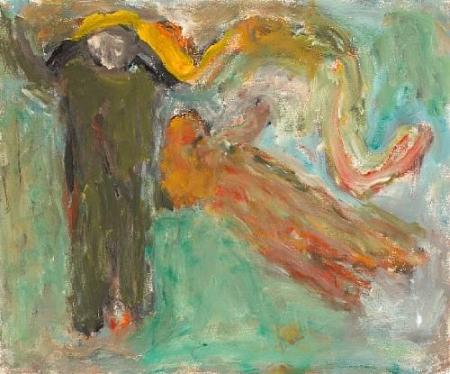
Me and Me
1994
Milton Resnick
d. March 12, 2004
_______________________
Oil
(An erasure of Genesis)
Kisha Lewellyn Schlegel
conjunctions
In the beginning, the earth was without form. The face of the deep moved upon the face of the waters. Light divided from darkness, shall become light, is becoming light. The earth brought forth great whales, and every living creature of the earth made the earth over and over and over and over.
There went up a mist from the earth. Dust of the ground breathed into life, out of the ground, pleasant to the sight, in the midst of the garden. Knowledge of good and evil went out and parted and became the onyx river. Bone of bones, and flesh of flesh, taken out of one flesh, naked and not ashamed.
Eyes opened in the cool of the day. Hid amongst the trees, between Enmity and Grief, Impulse and Rule, the ground of lives, thorn and weed, sweat of nostrils. Bread. Return. From her you were taken and to soil you shall return.
Of the ground, a flaming sword turned every way to keep the way. In process of time, brought the fruit of the ground unto hot faces, downcast. “The portal in the field is Brother. Am I my brother’s keeper?” Voice of blood, of brother of you, from the ground. The earth opened her mouth to blood, a fugitive and vagabond in the earth.
Upon the land, a city and tents and cattle; the father of the harp and organ; an instructor in brass and iron. All the days lived were generating and becoming all days. There were giants in the heart. The earth filled with pitch. The high hills were covered in nostril life.
(....)
The face of the earth waxed sore. With their faces to the earth, the naked let Fear commune with them. Their heart failed. They were afraid, saying, “Fear. Weep. Eat. Silver. Gold. Ground. City. Speak in ears, old and little dead. Eyes cannot pass the words a little food.”
Fear, buried and dim, stretched, unstable as water, into the secret assembly, gathering blood and milk to bear a fruitful well whose branches run over the wall, the grieved, the arms, the hands, the shepherd, the deep, the breasts, the womb, the utmost bound of the everlasting hills, the crown of the head, wolf, the prey … The field made a face to speak a sore lamentation for seven days, called beyond and unto, carried into the land and the cave an unsent messenger—Fear—in place, thought, this day. Fear not speaking shall bring up the bones.
...(more)
_______________________
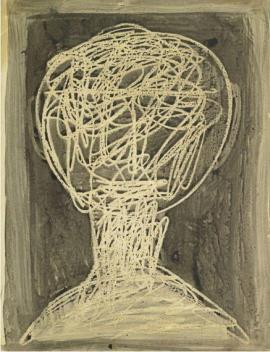
Victor Brauner
d. March 12, 1966
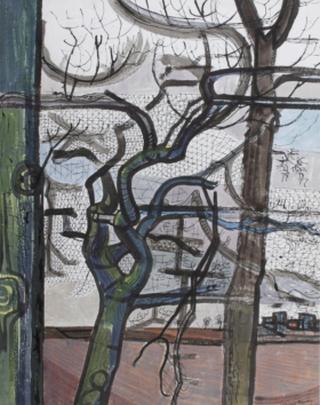
The Barren Tree
1954
Edward Bawden
b. March 10, 1903
_______________________
Detours
Hans Blumenberg -- Care Crosses the River
flowerville
Only by taking detours can we exist. If everyone took the shortest route, only one person would arrive.
There are an infinite number of detours from point of departure to destination, but only one shortest way. Culture consists in detours - finding and cultivating them, describing and recommending them, revaluing and bestowing them. Culture therefore seems inadequately rational, because strictly speaking only the shortest route receives reason's seal of approval. Everything right and left along the way is superfluous and can justify its existence only with difficulty. It is, however, the detours that give culture the function of humanizing life. In the strictness of its exclusions, the supposed "art of life" that takes the shortest routes is barbarism. ...(more)
_______________________
from In This World of 12 Months
Marcella Durand
Your voice carries easily through liquid; bridge is
halved by fog, as your tongue is divided in mist.
The fog of machinery augmented by steam.
Powered and then not powered, below a line, dark.
Cold, the weather has turned and out there, turbines still.
Water has divided, soft things and diverse: what
seemed one broke. Two cities and more. Lines reappear.
Across there is a wall also a door or steam
turns into fog. The bridge is two; light is taken.
People enjoy themselves, looking at glittering
potential floods. It is so nice to have a view.
_______________________
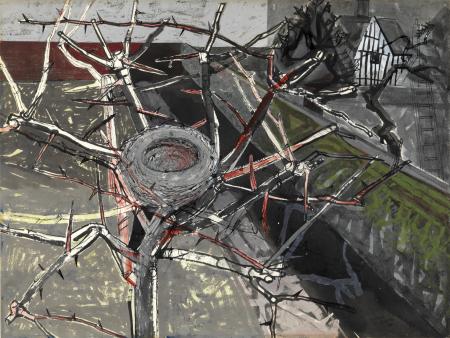
The Bird’s Nest
Edward Bawden
_______________________
Four Problems, Four Directions For Environmental Humanities:
Toward Critical Posthumanities For the Anthropocene
Astrida Neimanis, Cecilia Åsberg, Johan Hedrén
Abstract
Taking into account intersecting trends in political, academic, and popular engagements with environmental issues, this paper concerns the development of environmental humanities as an academic field of inquiry, specifically in this new era many are calling the Anthropocene. After a brief outline of the environmental humanities as a field, we delimit four problems that currently frame our relation to the environment, namely: alienation and intangibility; the post-political situation; negative framing of environmental change; and compartmentalization of “the environment” from other spheres of concern. Addressing these problems, we argue, is not possible without environmental humanities. Given that this field is not entirely new, our second objective is to propose specific shifts in the environmental humanities that could address the aforementioned problems. These include attention to environmental imaginaries; rethinking the “green” field to include feminist genealogies; enhanced transdisciplinarity and postdisciplinarity; and increasing “citizen humanities” efforts. _______________________
Molecular Red:
Theory for the Anthropocene (On Alexander Bogdanov and Kim Stanley Robinson)
McKenzie Wark
e-flux
(....)
Addressing the Anthropocene is not something to leave in the hands of those in charge, given just how badly the ruling class of our time has mishandled this end of prehistory, this firstly scientific and now belatedly cultural discovery that we all live in a biosphere in a state of advanced metabolic rift. The challenge then is to construct the labor perspective on the historical tasks of our time. What would it mean to see historical tasks from the point of view of working people of all kinds? How can everyday experiences, technical hacks and even utopian speculations combine in a common cause, where each is a check on certain tendencies of the other?
Technical knowledge checks the popular sentiment toward purely romantic visions of a world of harmony and butterflies—as if that was a viable plan for seven billion people. Folk knowledge from everyday experience checks the tendency of technical knowledge to imagine sweeping plans without thought for the particular consequences—like diverting the waters of the Aral Sea.7 Utopian speculations are that secret heliotropism which orients action and invention toward a sun now regarded with more caution and respect than it once was. There is no other world, but it can’t be this one.
What the Carbon Liberation Front calls us to create in its molecular shadow is not yet another philosophy, but a poetics and technics for the organization of knowledge. As it turns out, that’s exactly what Alexander Bogdanov tried to create. We could do worse than to pick up the thread of his efforts. So let’s start with a version of his story, a bit of his life and times, a bit more about his concepts, from the point of view of the kind of past that labor might need now, as it confronts not only its old nemesis of capital, but also its molecular spawn—the Carbon Liberation Front. Here among the ruins, something living yet remains.
...(more)
_______________________
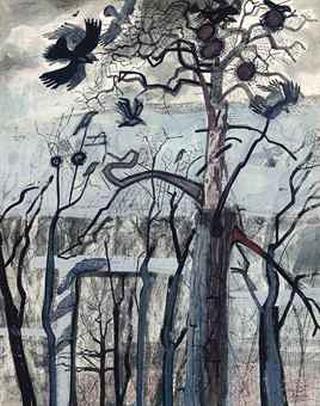
The Rookery
Edward Bawden
_______________________
What is more natural: thinking space and poetry
Marcella Durand interviewed by Sina Queyras
(....)
It’s debatable to me whether the term “eco-poetics” should be a defining term at all. It’s convenient and catchy, but poetry concerned with ecological issues needs to be flexible enough to accommodate the stream of information and rethinking and renaming that is ongoing around ecology, culture, science at the moment. Ecologically minded poetry may be more interesting, more investigative when there isn’t so much a predetermined manifesto, when it is not congealed into a sort of school with dictums to follow and practitioners. I realize this is rather hypocritical of me to say, since I did lay out a kind of schematics back in 2002 (“The Ecology of Poetry”), but I did from the start intend those to be possibilities only. I also meant that talk to be an alternative to the nature poetry I had been steeped in, but I didn’t want it to replace as the next de rigueur mode or whatever. Actually, the more I dig and think and research, the more all poetry seems like it could be read ecologically, as so much of writing deals with relations between self and other, re-engineering language subject, perception and exterior, where we fit into larger systems, landscape, history, culture—where and how we inhabit and how we negotiate with others inhabiting the same spaces.
...(more)
_______________________

The Road to Thaxted
Edward Bawden
1956
_______________________
Texte Zur Kunst
Issue No. 97 / March 2015 "Bohemia"
Bohemia = Utopia?
Douglas Coupland
Whenever I bring up the subject of bohemianism, the collective reaction is so uniformly: “What do you mean by bohemian! Define your terms! Forget it, I don’t even want to discuss this!” that it tells me that I seem to have pushed a button. But we all already know what bohemianism means. And so it makes me wonder what it is about its common definition that we dislike so much – this freedom to live outside the mainstream, eking out a living preferably doing something creative, an existence lacking roots but affording the freedom to travel and live with other bohemians. Doesn’t this basically describe most self-employed people in the art world – all those kept afloat by occasional sales, grants, residencies, discount flights to and from Berlin, London, and NYC, the odd teaching gig, as well as by their partners’ or family’s income? The button I think I’ve pushed is the collective realization that the middle class, like an Antarctic ice shelf, is vanishing at a shocking rate and will, within 15 to 20 years, most likely be gone. In its stead we will have, it seems, a new class structure – one that will alter the notion of what bohemian freedom is, while simultaneously reducing its possibility.
This scenario was easy enough to predict back in the late 1980s. What’s been more difficult to handle has been watching the middle class disintegrate in real time. But since few are in denial about the middle class’s impending doom, the magic thing about the present moment is that everyone everywhere is, with great anxiety, trying to figure out what comes next. What comes next I would call the “blank-collar class.” It’s not Fordist blue-collar. It’s not “Hi! It’s 1978 and I’m a travel agent!” white-collar. Blank collar means this – and listen carefully because this is the rest of your life – if you don’t possess an actual skill (surgery, baking, plumbing) then prepare to cobble together a financial living doing a mishmash of random semi-skilled things: massaging, lawn-mowing, and babysitting the children of people who actually do possess skills, or who own the means of production, or the copper mine, or who are beautiful and charismatic. And here’s the clincher: The only thing that is going to make any of this tolerable is that you have uninterrupted high-quality access to smoking hot Wi-Fi. Almost any state of being is okay in the twenty-first century as long as you can remain connected to this thing that turns you into something that is more than merely human.
...(more)
_______________________
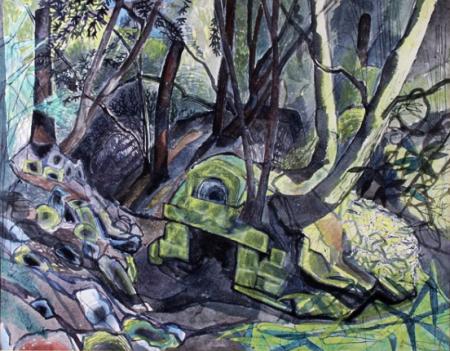
Cornish Well
Edward Bawden
c. 1977
_______________________
In This World Previous to Ours
Marcella Durand
conjunctions
Divided as half of me is small and distant.
The other tongue talks of exterior objects,
while this one speaks of water and limitation.
Neither understands the other and while looking
for a translator the street ends the clock changes.
Drummers gather, crowd like a meteor, a crush.
Tongue only delivers, does not listen, stone deaf.
All talking makes a crowd plural agitation.
Stand here and see the river an entirely
different way: Under water is air and through
air, passage. Color is another wave that takes
sand, rocks, bridge. Water will reflect everything but
what is inside it. It is like that, trying to
describe it. Like that, I scramble along a shore
catching up to the crowds, people standing there, each
one a stranger, what do I have to say to them?
I want to tell them, but language has divided;
we stand divided, each another point, a line.
...(more)

Ygdrasil, Herbst in Der Auvergne
2010
Anselm Kiefer
b. March 8, 1945
_______________________
Urban Koans
Jordan Mounteer
lemon hound
(I)
Bricked corridors, buildings bunched
elbow-to-elbow in the blue-shift
of coastal rain. Street-lamps duck
and blush as we pass, fluoride-gazes
eschewing all but their own perimeters
of pavement, vision hung like a bell
in some Pavlovian stoicism. In a corner café
the woman beside me uses “logistic”
too often to describe the process
for naming her first daughter.
Magnetic interferences of other lives,
their corners flush. Rogue patterns
inter-splice our own – how at this age
all my friends are institutionalized by marriage,
how right angles fashion themselves in every
sky-line silhouette and turn of phrase,
how the word alone in this city
is anaphoric to being.
...(more)
_______________________
The Sufficiency of Beauty in an Hour of Happiness
Jordan Mounteer
(....)
I can recall with an almost eidetic precision the way a day could stretch on almost into the illimitable. Childhood was spent in the spontaneous pursuit of random wonders – building stone dams and reservoirs in a creek for hours, constructing tree-forts and exploring the back forty behind our homestead. Even the earliest artistic acts of drawing other worlds, writing short stories replete with characters born from my own imagination.
The consequence of youth, of a capacity for events and details to imprint themselves, the fluid spree of long-term memory. It is with age, seemingly, that the novel is less abundant, and therefore time seems to accelerate – you can scarcely believe the speed in which a week, or a month, or a year is relegated to the past.
No, that seems arrogant. I think instead we are simply less surprised by the novelty of our lives, after a time. For some of us this becomes a ‘waiting around’ for what we anticipate or expect of our lives. For others, it is simply a weariness, or a dissatisfaction with our lot, which precedes this acceleration. The obvious counter-point to this claim is that happiness must follow, or be simultaneous with, the extinguishing of desires.
...(more)
_______________________
A Global History of Post-humans
Rick Searle reviews Ynval Harari's Sapiens: A Brief History of Humankind
Utopia or Dystopia
(....)
The quirk of human nature that for Harari made both the Cognitive and Agricultural Revolution possible and led to much else besides was our ability to imagine things that do not exist, by which he means almost everything we find ourselves surrounded by, not just religion, but the state and its laws, and everything in between has been akin to a fantasy game. Indeed, Harari left me feeling that the whole of both premodern and modern societies was at root little but a game of pretend played by grown ups, with adulthood perhaps nothing more than agreeing to play along with the same game everyone else is engaged in. He was especially compelling and thought provoking when it came to that ultimate modern fantasy and talisman that all of us, from Richard Dawkins to, Abu Bakr al-Baghdadi believes in; namely money.
...(more)
_______________________
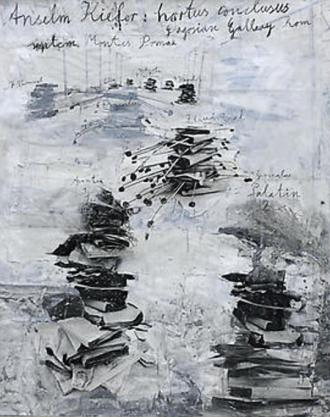
hortus conclusus
Anselm Kiefer
2009
_______________________
What Is Called History at the End of Modernity? (Part II)
James Livingston
(....)
What is the point? Is there a usable past, a question that already presupposes that the past as such is unknowable, and so must be subdivided according to our present purposes? I used to think so. I ‘m not so sure anymore. The cultural function of the modern historian, I used to say, is to teach his or her fellow citizens how to learn from people who differed from us due to historical circumstances, which include the range of plausible ideological or intellectual commitments. We “go back” to the past in the hope of equipping ourselves with the experience, and perhaps the wisdom, of those who have come before us. We “come back” to the present with a wider range of choices, accordingly, because now we know not what to think but how to think differently, by adopting assumptions about the human condition from the past that our fellow citizens probably cannot share.
I’ll set aside my doubts about a usable past for a moment. We don’t study history if we’re not interested in the impending future, that is, if we don’t think our choices in the present will shape it. Instead, we’ll get old-time religion—the kind that comes before the Reformation, the kind that comes in the form of resignation and retreat from the profane world—or we’ll indulge in conspiracy theory; both of these attitudes toward history typically relocate agency from the realm of the possible, which is the region of the political, to the prerogative of the supernatural or, what is the same thing, the unidentifiable “powers that be,” who are god-like in their omniscience.
Insofar, on the other hand, as we get interested in the impending future as a political issue subject to our choices, we’ll acquire a stake in identifying the problems and deciphering the possibilities of the present. If we see real possibilities for progress in our present circumstances, we’ll get even more interested in that impending future—more optimistic about solving those problems. But the only way to see the possibilities and to identify the problems of the present is to study the past.
In other words, we study the past so that we can shape the future. Our hopes for the future, and our fears about it—our political assessment of the present—will determine our approach to the past. And vice versa. Having political commitments in the present requires us to do history. Notice that, as a result, our study of history prepares us not for “the” future, but a future.
...(more)
_______________________
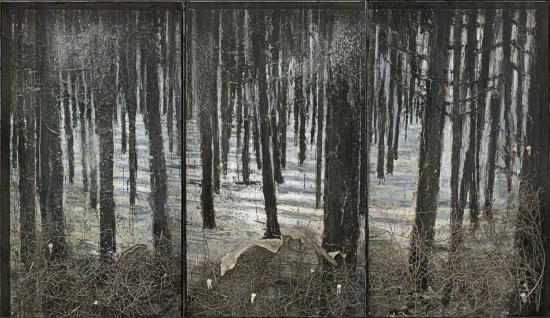
Winterland
Anselm Kiefer
2010
_______________________
Liminal
from a treeplanter's journal
Jordan Mounteer
(....)
The pure, clean drive toward liminality
and what lies on the other side of it, a life alone
in these aisles of mist. Like a wounded beast
flung into the bush to die, I have never been afraid
of death, which clings like sweat to every surface.
Only of growing old enough to see it like
it is, a black stag watching me with black
silent hooves from between black trees.
...(more)
_______________________
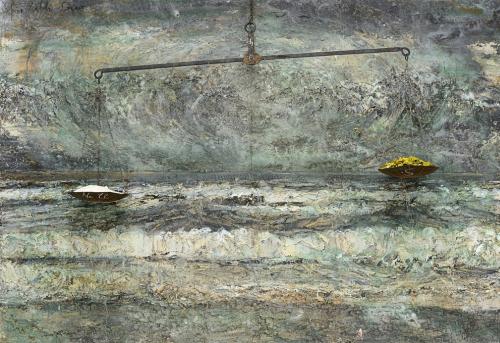
Für Rabbi Loew
Anselm Kiefer
2010 - 2012
_______________________
Crystals of Eternity
Larval Subjects
Perhaps it’s like this. The eternal and universal are not something that is already there, but rather are something that is produced. Here, of course, I’m dancing with Badiou. If it is true that the eternal and universal are something produced, then they are also wagers. No one can know in advance whether something will be eternal or universal. Only time will tell. This entails that both universality and eternity will perpetually face challenges. At any moment these crystals of time could fracture and shatter to pieces. I am here, above all, thinking about works of art. The eternal and universal work of art– song, painting, sculpture, prose, poem, architecture, etc. – is slippery. ...(more)

photo - mw
_______________________
Some thoughts on the GeoHumanities
Tim Cresswell
(....)
The great obsession of the nineteenth century was, as we know, history: with its themes of development and of suspension, of crisis, and cycle, themes of the ever-accumulating past, with its great preponderance of dead men and the menacing glaciation of the world. […] The present epoch will perhaps be above all the epoch of space. We are in the epoch of simultaneity: we are in the epoch of juxtaposition, the epoch of the near and far, of the side-by-side, of the dispersed. We are at a moment, I believe, when our experience of the world is less that of a long life developing through time than that of a network that connects points and intersects with its own skein.
Soon space was everywhere. Sociologists and anthropologists, aware of course, of their inheritance of the works of the Chicago School of Sociology and the ethnomethodology of Erving Goffman on the one hand, and Levi-Strauss on the other, experienced a renewed interest in the way space works its ways into the crevices of social and cultural processes as an active agent in the production, maintenance and transformation of everyday life. This was given an added boost by the eager take up of the problem of space in the nascent cultural studies and through the translation of Henri Lefebvre’s foundational book, The Production of Space. Even the more scientific ends of social science, which had long been set on arriving at law-like universal generalizations for human behavior, began to recognize that the space in which social things happen is neither the mythical isotropic plain of many models nor the head of a pin danced on by angels. Forms of spatial modeling become more sophisticated, starting with cluster analysis and moving to a general recognition of the importance of place, mobility and spatial variation.
...(more)
Varve
Tim Cresswell, place, landscape, mobility, poetry _______________________
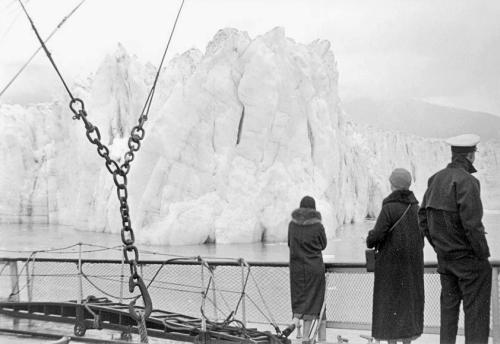
Andrews (Roy C.) Photographs
Oregon Digital
University of Oregon Libraries
_______________________
Three poems
Tim Cresswell
lemon hound
Dawn Of The Planet Of The Apes
Sipping my second Bloody Mary, half
way through the inflight movie, crying
again. The kid slips the book to the
orangutan and something snaps. I ponder
the vanity of violence and vengeance
and what I would do in ruined San Francisco
faced with murderous talking primates
in this disease-wracked, decimated world.
I must play more Monopoly with Maddy,
take fewer flights, go for walks around
the Arnold Arboretum, learn identities
of birds from sound alone. But armies armed
to the teeth are sweeping south to liberate
this tired town and time is running out.
...(more)
_______________________

Frozen History
Josef Hoflehner
_______________________
e-flux #63 March 2015
Circulation and Withdrawal, Part II: Withdrawal
Simon Sheikh
(....)
For Virno, the notion of exit is connected to the term “civil disobedience,” as acts of not only protest, but also of active refusal to participate in the surplus production and exploitation of labor under the conditions of capital. It is not, however, unproductive; rather, “exit hinges on a latent kind of wealth” and “an exuberance of possibilities” for producing value that is not accountable, not transformable into cultural entrepreneurship. This is, of course, the question that faces all critical magazines, not only in the way they often employ an extended use of unpaid labor, not in a sense of exploitation, but as rather a removal of both work time and free time from surplus production. In order to create criticality, withdrawal is necessary, not as an inactivity, but as an alternative production of value and meaning:
Defection allows for a dramatic, autonomous, and affirmative expression of this surplus; and in this way it impedes the “transfer” of this surplus into the power of state administration, it impedes its configuration as productive resource of the capitalistic enterprise.
This withdrawal is, as we shall see, simultaneously contradicted by circulation, partly in terms of which reach and which constituency the magazine has and wants, as well as in how it deals with the inevitable production of surplus that occurs with increased circulation. The question here is one of sustainability, both economically and intellectually. On the one hand, it is impossible in the long run to sustain production based only on free labor, or very low costs; on the other, there is the question of how the income, however minimal, is distributed among the producers of the magazine. Moreover, evading the state’s regulation of your personal economic situation (i.e., taxes, benefits, and so forth), while producing public things, such as a publication, is also difficult to sustain over longer periods, due to the confluence of economy and governmentality in modern state power, notwithstanding the issue of alternative economies and their possibilities for cultural and critical production. Exit is thus never absolute, but part of tactical movements of circulation and withdrawal. Furthermore, criticism must always have an object, whether in the narrow sense of an artwork or exhibition, or in the broadest sense of the art world, societal structures of power, or capitalism as a world system of governance and exploitation. In other words, your intellectual stance, as critique, must define its position not just in terms of ideology, but also, more methodologically, in terms of angle and vicinity.
...(more)
“Circulation and Withdrawal, Part 1: Circulation”
Simon Sheikh
_______________________

László Mednyánszky
1852-1919
_______________________
Walzer on Islamism and the Left
Justin E. H. Smith
berfois
(....)
I am one of those people who has trouble seeing how ‘religion’ can serve as a useful analytic category: I am quite seriously uncertain that I even understand what it is. It seems to me that there are perpetrators of political violence who conceptualize their deeds as having something to do with something they think of as their religion, Islam, but it is not clear to me that the content of their beliefs about what Islam involves needs to be invoked in order to get a sufficiently rich understanding of their deeds. In any case these deeds do not seem to me to be generically different from Hindutva violence or the well-known cases of 20th-century mass violence carried out in the name of non-transcendent objectives like equality. (After all, the best point of comparison for ISIS in recent history, as Pankaj Mishra has noticed, is the Khmer Rouge terror.) There is nothing special about the Islamic species of the genus, and what unites all the cases generically does not seem to me to be beliefs about the transcendent order, so much as a hatred of freedom, doubt, ambiguity, and self-expression by individuals within the mundane order.
...(more)
Islamism and the Left
Michael Walzer
_______________________
Andrei Tarkovsky’s Message to Young People
open culture
I don’t know… I think I’d like to say only that they should learn to be alone and try to spend as much time as possible by themselves. I think one of the faults of young people today is that they try to come together around events that are noisy, almost aggressive at times. This desire to be together in order to not feel alone is an unfortunate symptom, in my opinion. Every person needs to learn from childhood how to spend time with oneself. That doesn’t mean he should be lonely, but that he shouldn’t grow bored with himself because people who grow bored in their own company seem to me in danger, from a self-esteem point of view.
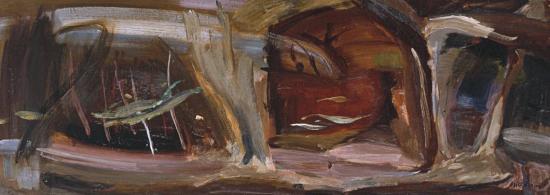
Forest Edge No. 2
1944
Ivon Hitchens
b. March 3, 1893
_______________________
What Is Called History at the End of Modernity?
James Livingston
s-usih
In his foreword to the new Modern Library edition of Absalom, Absalom!, which first ran in the New York Times Magazine, the celebrated essayist John Jeremiah Sullivan equates the “collapsing of time” in William Faulkner’s great novel with historical consciousness as such: “The book attempts something that had never been tried before in the art of fiction, and as far as I know has never been since—to dramatize historical consciousness itself, not just human lives but the forest of time in which the notion of human life must find its only meaning.”
Sullivan could not be more wrong about the art of fiction, nor about what Faulkner attempted and achieved in Absalom. Go ahead, forget Faulkner for the moment, try to name a novel or short story that doesn’t enrich rather than erase the centrifugal times gathered by memory—not even Robbe-Grillet will serve this purpose. But about historical consciousness, which once presupposed acknowledgement of profound differences between past and present, he is perhaps right. For in offering these preposterous assertions about Faulkner’s achievement in Absalom, Sullivan adopts the same attitude that animates the new “history of capitalism,” a field convened by the denial of elementary differences between here and there, this and that, now and then—present and past—as if the night in which all cows are black has finally fallen.
...(more)
_______________________
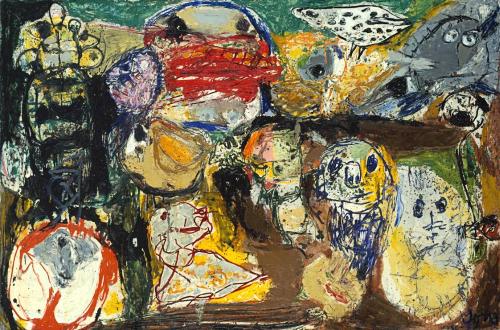
Letter to My Son
1956
Asger Jorn
b. March 3, 1914
_______________________
On Memory: New Japanese Writing
Words without Borders - March 2015
On Memory: New Writing from Japan
David Karashima
This is the fourth issue of Words without Borders focusing on Japan (and the third supported by the British Centre for Literary Translation/Nippon Foundation partnership). For this issue we decided to focus on memory. We don’t quite remember why. It may or may not have had something to do with this being a year commemorating the beginning or end of one war or another, or it may, or again may not, have had to do with the simple fact—the one fact that we can be relatively certain of—that we have recently been made increasingly aware of the everyday failings of our own memories. While the exact origins of the decision remain unclear, we are pleased to say with the utmost certainty that, if we remember correctly, the resulting collection of diverse rememberings, misrememberings, rerememberings, forgettings, misforgettings, is if not(hing is) unforgettable, then memorable in many ways.
...(more)
_______________________
Akim, Zappy and the Green Eye
Pierre Joris
exquisite corpse
Is there life before reading? I am not certain — & grow less certain as time passes, as I grow old & memory, like nostalgia, isn’t what it used to be. So if you ask me what it was like to be a child, I will have a hard time answering — and not just because I do not remember it as being the best time of my life. Not that I wouldn’t be interested in finding out for myself. But how to be a historian of one’s own past, if istorin — the Greek word for history — means for the one historian I trust (because I love to read him) to find out for oneself. How can I go there from now? Maybe I can write myself there, i.e. activate dreaming and reading and come back forward.
...(more)
_______________________
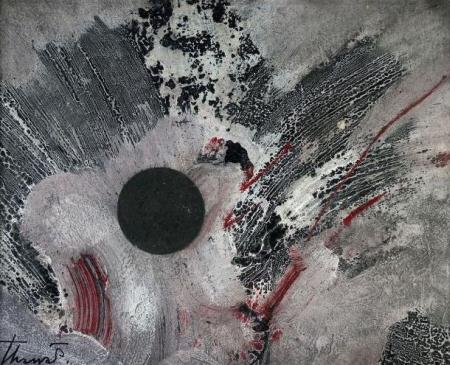
Joan-Josep Tharrats
b. March 5, 1918
_______________________
Pioneers in the Digital Snow
Mark Mordue
berfois
(....)
Tweets, blogs, social networking sites… if it can’t fit in your smartphone window and be grasped at a glance it ain’t worth your time of day. The trend perceptions on this electronic revolution have leant towards the obvious – more communication on every front, a greater necessity for speed in every act, the compression of information to match that speed, and with all that rapid-fire pressure a corresponding desire to find some alleviating air-space for the mind whenever and wherever possible. Zero sum game: triviality, gossip, and porn are king. Not to mention the brilliant sub-editor who can keep story titles like “Headless woman in a topless bar” rolling across the news breaks when you log out of your email. Click. It works.
It can seem like our culture is being ferried on its own electronic light all the way into hell. The digital equivalent to Aldous Huxley’s “soma” in Brave New World, where we become prisoners to our own desires, and raptured out of consciousness.
But is that really all that is happening for those who worry about such things rather than just indulge and enjoy? I feel more positive even as the house of the modern mind appears to be atomizing around me.
...(more)
_______________________
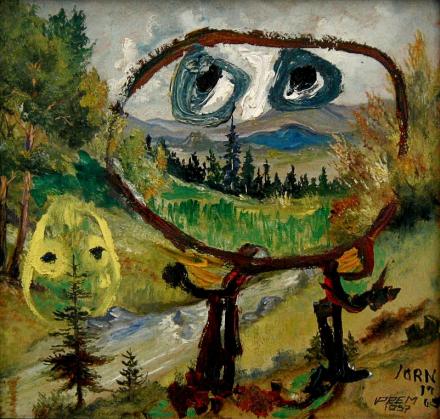
Asger, Jorn, Enticement
Asger Jorn
1960.
_______________________
Beginning with "The Image" in How It Is
when translating certain processes of digital language art
John Cayley
electronic book review
Practices and theories of translation are situated at a crucial position in the domain of the practices and theories of language. We are comfortable with distinguishing practices of language whose systematic differences allow us to say that the users of languages in which they are separately competent are, nonetheless, “mutually unintelligible” to one another, and so we may say that they are using different, distinct languages. However, certain practitioners may be proficient in any number of such languages and they may be able to perform in the languages they “know” in a manner which, they claim, regularly corresponds with performances in another language. This ability is commonly called “translation” and even though nothing—more especially no “thing”—has been translated (moved from one “place” to another), such intercultural circumstances have led to a widely held belief that different languages share some thing that could be so moved and thus translated. This “thing” is usually identified with an interpretable, paraphrasable “meaning” but may also, in more developed theories, be complicated with correspondences of affect, or with world-building associative networks of significance and affect. However, if, in our thinking, we maintain a focus on actual practices of language—always necessarily sited in particular cultures—we can, and, in my view, should, largely disregard theoretical models that are philosophically discredited, especially since poststructuralism, and highly misdirective for any discussion of what language is, ontologically. Language is not some thing in a world, and never has been. Works of language art are not themselves and do not produce “translatable” things. “Translation” is a word associated with a prejudicial conceptual framework. It must and will be used for the sake of convention, but within it the intellectual skepticism indicated by quotation marks should always (already) be inscribed.
...(more)

photo - mw
_______________________
Wislawa Szymborska: Some like poetry
translated by Adam Czerniawski
presented by Tom Clark
(....)
Poetry --
but what is poetry.
There have already been
several shaky answers
to this question.
But I don't know and I don't know and I hold on to this
like a saving hand-rail.
...(more)
_______________________
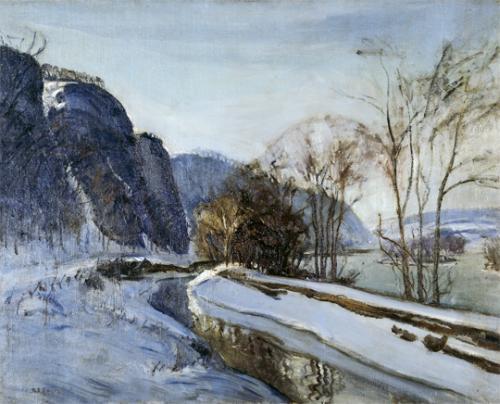
The Narrows
1936
Walter Baum
(1884-1956)
_______________________
A Vindication of Hypnosis
Sergio Pitol
Translated by George Henson
bomb
Suddenly, during a pause in his monologue, Federico Pérez cautioned me not to become too lost in circumlocution. I should lay everything on the line, he said. I replied that I had already done that the very day I made the appointment by phone. I was trusting that his treatment by hypnosis, about which I had heard great things, would help me give up smoking. If I had gone into too many details at the beginning of my explanation, it was to clarify what my relationship with tobacco was and had been. I do not remember his exact words, but he did allude to the evasiveness and circumlocutions in my speech. He added that he thought it was a manifestation of insecurity, a defense mechanism behind which I was hiding. I do not know if the doctor’s intervention, his interruption and description of the structure of the story, which unbeknownst to me had become unnecessarily and painfully labyrinthine, was part of the treatment, an attempt to stimulate a particular reaction, the beginning of subjugation. I defended myself with literary arguments. I took refuge in the fact that my writing was fundamentally built on those devices. ...(more)
_______________________
Claudia Rankine
by Lauren Berlant
I met Claudia Rankine in a parking lot after a reading, where I said crazy fan things like, “I think we see the same thing.” She read a book of mine and wrote me, “Reading it was like weirdly hearing myself think.” This exchange is different from a celebration of intersubjectivity: neither of us believes in that . Too much noise of racism, misogyny, impatience, and fantasy to weed out. Too much unshared lifeworld—not just from the difference that racial experience makes but also in our relations to queerness, to family, to sickness and to health, to poverty and wealth—while all along wondering in sympathetic ways about the impact of citizenship’s embodiment. Plus, it takes forever to get to know someone and, even then, we are often surprised—by ourselves, by each other. Claudia and I have built a friendship through consultation about whether our tones are crazy, wrong, off, or right; about whether or not our observations show something, and what. And, through frankness: a form of being reliable that we can trust, hard-edged as it can be, loving as it can be (and sometimes the former is easier to take than the latter). We are both interested in how writing can allow us to amplify overwhelming scenes of ordinary violence while interrupting the sense of a fated stuckness. This interview, conducted via email, walks around how we think with and against the convenience of conventionally immiserated forms of life and art.
(....)
Claudia Rankine: Tone is an everyday kind of maneuver. It disrupts and communicates aggression, disgust, dis- respect, and humor, among a myriad of possibilities, thereby allowing language to morph into a blanket or a gun. It helps me know how to read the spaces between things. One has an ear out for it always. It’s a thing to be translated. Yours is a good question because it presupposes certain expectations for tone in public encounters, places where equality and sharing are legislated to happen, places where one has expectations for justice, for evenhandedness, and for “we are all just people here” indifference. I don’t exactly expect disdain when paying for my bagel. Not at 9 AM in a café, anyway!
...(more)
BOMB — Artists in Conversation
_______________________
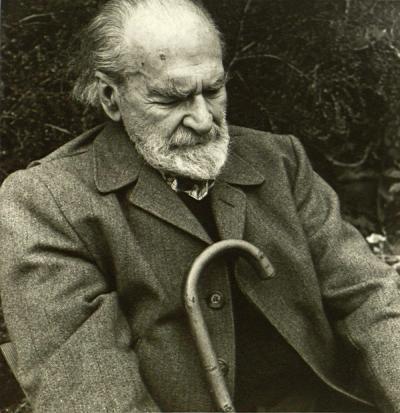
Basil Bunting
(1 March 1900 – 17 April 1985)
photo by Jonathan Williams.
from Odes: 15 ["Nothing"]
Basil Bunting
Nothing
substance utters or time
stills and restrains
joins design and
supple measure deftly
as thought’s intricate polyphonic
score dovetails with the tread
sensuous things
keep in our consciousness.
Celebrate man’s craft
and the word spoken in shapeless night, the
sharp tool paring away
waste and the forms
cut out of mystery!
When taut string’s note
passes ears’ reach or red rays or violet
fade, strong over unseen
forces the word
ranks and enumerates...
mimes clouds condensed
and hewn hills and bristling forests,
steadfast corn in its season
and the seasons
in their due array,
life of man’s own body
and death...
The sound thins into melody,
discourse narrowing, craft
failing, design
petering out.
Ears heavy to breeze of speech and
thud of the ictus.
Basil Bunting at EPC and the Poetry Foundation
_______________________

W. Elmer Scholfied
1867 - 1944
_______________________
Against property (and sumak kawsay)
No Borders Metaphysics
A beautiful theme that emerges from Noys book on accelerationism (Malign Velocities, Winchester: Zero Press, 2013) is the appeal to innovative, even glamourous ideas to counter the seemingly daring gestures of accelerationism (and one-track left reasoning in general). Noys stresses the importance of rethinking work. (See my post on Noys'book.) To reconceive work in order to make it less precarious and also less dull requires rethinking property. The left is nowadays very vague or very modest in its critique of property in general, as a political and ontological outrage. It is vague because Marxists insist on the various processes of proletarisation (of dispossessed peasants, of illegal migrants, of those rendered redundant by technological advances) and make clear that a work force has to own nothing but their labour, in contrast to those who own means of production. But it rarely proposes policies and strategies to weaken property. It is modest because people like the Pirate Party are clearly against intellectual property but rarely make clear that the problem is more general and lies in property in general. I think the left ought to make clear that property is something that would better go.
...(more)
_______________________

photo - mw
_______________________
Is there a library-sized hole in the internet?
David Weinberger interviewed
Library knowledge – the content; the metadata; what librarians and the community know about items held – is being lost to the web. This represents an immense amount of culture. The most basic components of the web are links, but if you want to talk about a book, what do you link to? There is no clear answer. They might turn to Wikipedia, but only around 70,000 books actually have a page on Wikipedia, so people rely on commercial sites like Amazon. We aren’t even meeting the most basic requirement, linking, much less having a way to refer to the history of the work, how it’s affected people and culture.
Facebook holds huge volumes of information about its users and their lives, but we have no equivalent for what libraries know. That is a huge hole in the internet, and it has at least two negative consequences. Firstly, as library information becomes harder to find, it becomes less relevant. Secondly, libraries themselves become marginalised. The culture that libraries represent becomes invisible on the internet, and the perceived value of libraries diminishes. This is a very real problem. Libraries can address it, but it will take a lot of effort.
...(more)
|






























